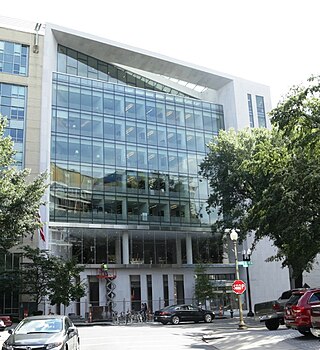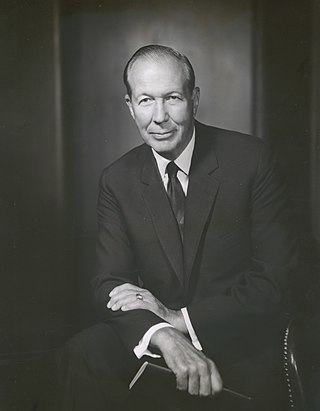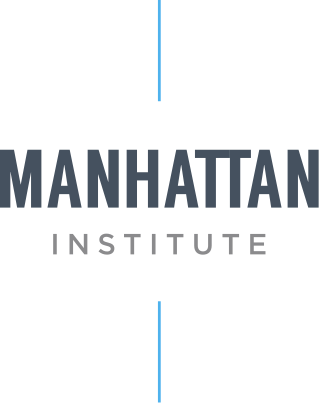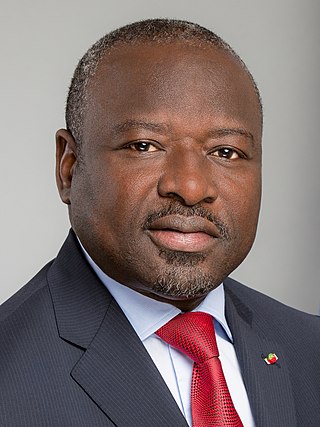
The Comprehensive Nuclear-Test-Ban Treaty (CTBT) is a multilateral treaty to ban nuclear weapons test explosions and any other nuclear explosions, for both civilian and military purposes, in all environments. It was adopted by the United Nations General Assembly on 10 September 1996, but has not entered into force, as eight specific nations have not ratified the treaty.

The National Rifle Association of America (NRA) is a gun rights advocacy group based in the United States. Founded in 1871 to advance rifle marksmanship, the modern NRA has become a prominent gun rights lobbying organization while continuing to teach firearm safety and competency. The organization also publishes several magazines and sponsors competitive marksmanship events. According to the NRA, it had nearly 5 million members as of December 2018, though that figure has not been independently confirmed.

The Bulletin of the Atomic Scientists is a nonprofit organization concerning science and global security issues resulting from accelerating technological advances that have negative consequences for humanity. The Bulletin publishes content at both a free-access website and a bi-monthly, nontechnical academic journal. The organization has been publishing continuously since 1945, when it was founded by Albert Einstein and former Manhattan Project scientists as the Bulletin of the Atomic Scientists of Chicago immediately following the atomic bombings of Hiroshima and Nagasaki. The organization is also the keeper of the symbolic Doomsday Clock, the time of which is announced each January.

The Center for Strategic and International Studies (CSIS) is an American think tank based in Washington, D.C. From its founding in 1962 until 1987, it was an affiliate of Georgetown University, initially named the Center for Strategic and International Studies of Georgetown University. The center conducts policy studies and strategic analyses of political, economic and security issues throughout the world, with a focus on issues concerning international relations, trade, technology, finance, energy and geostrategy.

Israel is widely believed to possess weapons of mass destruction, and to be one of four nuclear-armed countries not recognized as a Nuclear Weapons State by the Non-Proliferation Treaty (NPT). The US Congress Office of Technology Assessment has recorded Israel as a country generally reported as having undeclared chemical warfare capabilities, and an offensive biological warfare program. Officially, Israel neither confirms nor denies possessing nuclear weapons.

The Missile Technology Control Regime (MTCR) is a multilateral export control regime. It is an informal political understanding among 35 member states that seek to limit the proliferation of missiles and missile technology. The regime was formed in 1987 by the G-7 industrialized countries. The MTCR seeks to limit the risks of proliferation of weapons of mass destruction (WMD) by controlling exports of goods and technologies that could make a contribution to delivery systems for such weapons. In this context, the MTCR places particular focus on rockets and unmanned aerial vehicles capable of delivering a payload of at least 500 kilograms (1,100 lb) to a range of at least 300 kilometres (190 mi) and on equipment, software, and technology for such systems.

The Nuclear Threat Initiative, generally referred to as NTI, is a non-profit organization located in Washington, D.C. The American foreign policy think tank was founded in 2001 by former U.S. Senator Sam Nunn and philanthropist Ted Turner and describes itself as a "nonprofit, nonpartisan global security organization focused on reducing nuclear and biological threats imperiling humanity."
Leslie Howard "Les" Gelb was an American academic, correspondent and columnist for The New York Times who served as a senior Defense and State Department official and later the President Emeritus of the Council on Foreign Relations.

Joseph Cirincione (, SIR-in-see-OWN-ee is a national security analyst and author. He served as the president of the Ploughshares Fund, a public grant-making foundation focused on nuclear nonproliferation and conflict resolution.

Jessica Tuchman Mathews is an American international affairs expert with a focus on climate and energy, defense and security, nuclear weapons, and conflict and governance. She was President of the Carnegie Endowment for International Peace, an international affairs think tank headquartered in Washington, D.C., with offices in five other countries, from 1997 to 2015. She has also held jobs in the Executive and Legislative branches of government, management and research in nonprofits, and journalism.
Dr. Randall Caroline Forsberg led a lifetime of research and advocacy on ways to reduce the risk of war, minimize the burden of military spending, and promote democratic institutions. Her career started at the Stockholm International Peace Research Institute in 1968. In 1974 she moved to Cambridge, Massachusetts to found the Institute for Defense and Disarmament Studies (IDDS) as well as to launch the national Nuclear Weapons Freeze Campaign. Randall Forsberg was accompanied by an important colleague by the name of Helen Caldicott while she was leading the Nuclear freeze movement in both Manhattan and Central Park. Both women were met with many challenges in their efforts to lead the Nuclear Freeze Movement. These challenges included gender discrimination and discreditation as influential leaders by the media. Forsberg's strong leadership in the nuclear freeze movement is thought to be very influential in the writing of foreign policy during the Reagan administration and is even credited with catalyzing the negotiation of the INF treaty between President Reagan and Mikhail Gorbachev.

Gloria Charmian Duffy is a former U.S. Department of Defense official, businesswoman, social entrepreneur and nonprofit executive. Since 1996, she has been the president, CEO and a member of the Board of Governors of the Commonwealth Club of California, America's largest and oldest public forum, founded in 1903. From 2010 to 2017 she led the acquisition, financing, design, entitlements and construction of the club's first headquarters building, at 110 The Embarcadero in San Francisco. The grand opening for the club's new building took place on September 12, 2017. The building received a 2016 California Heritage Council award for historic preservation.
Council for a Livable World is a Washington, D.C.-based non-profit advocacy organization dedicated to eliminating the U.S. arsenal of nuclear weapons. Its stated aim is for "progressive national security policies and helping elect congressional candidates who support them." The Council was founded in 1962 as the Council for Abolishing War by Hungarian nuclear physicist Leó Szilárd. Its education and research arm, the Center for Arms Control and Non-Proliferation, provides research to members of Congress and their staff. In February, 2016, John F. Tierney was appointed the executive director of the Council for a Livable World and the Center for Arms Control and Non-Proliferation. For more than 50 years, the Council for a Livable World has been advocating for a more principled approach to U.S. national security and foreign policy.
Deborah Fikes is a member of the Council on Foreign Relations and serves on the board of directors of the Arms Control Association. She is a co-president of Religions for Peace, the world’s largest and most representative multi-religious coalition, with offices in New York. Fikes serves as an executive advisor to the World Evangelical Alliance, which represents a constituency of 650 million with alliance offices in 129 countries, and was the WEA's permanent representative to the United Nations from 2009-2016. She served for three consecutive terms as a board member of the National Association of Evangelicals (NAE), which represents 45,000 churches in the United States.

Catherine McArdle Kelleher was an American political scientist involved in national and international security policy. She was Senior Fellow at the Watson Institute for International Studies at Brown University and College Park Professor of Public Policy at the University of Maryland. Kelleher was the Director of the Aspen Institute in Berlin from 1998 to 2001 when she was appointed Professor of Strategy at the Naval War College (2001–2006). In the 1990s she was appointed Honorarprofessor at the Free University of Berlin, and she regularly taught at the Geneva Center for Security Policy in Switzerland for over a decade.

William Chapman Foster was an American businessman and high-ranking government official. He served as United States Under Secretary of Commerce and United States Deputy Secretary of Defense under President Harry Truman. Later, he served as the first United States Arms Control and Disarmament Agency director, under Presidents John F. Kennedy and Lyndon B. Johnson.

The Manhattan Institute for Policy Research is an American conservative think tank focused on domestic policy and urban affairs, established in Manhattan in 1978 by Antony Fisher and William J. Casey. The institute has produced books, articles, interviews, speeches, op-eds, policy research, and the quarterly publication City Journal. Reihan Salam is the current president of the organization, which he has led since 2019.

Lassina Zerbo is a Burkinabé politician and scientist who served as the Prime Minister of Burkina Faso from 2021 to 2022. Prior to that he was the Executive Secretary of the Comprehensive Nuclear-Test-Ban Treaty Organization. On 24 January 2022, Zerbo was deposed in a coup d'état.
Michael D. Intriligator was an American economist at the University of California, Los Angeles, where he was Professor of Economics, Political Science, and Policy Studies, and Co-Director of the Jacob Marschak Interdisciplinary Colloquium on Mathematics in the Behavioral Sciences. In addition, he was a Senior Fellow at the Milken Institute in Santa Monica, a Senior Fellow of the Gorbachev Foundation of North America in Boston, a Foreign Member of the Russian Academy of Science, and a Fellow of the American Association for the Advancement of Science. He received his Ph.D. in Economics at MIT in 1963 and the same year joined the UCLA Department of Economics. He taught courses in economic theory, econometrics, mathematical economics, international relations, and health economics, and received several distinguished teaching awards.

Yleem D.S. Poblete is a former American government official who served as the United States Assistant Secretary of State for Verification, Compliance, and Implementation from April 30, 2018 to June 7, 2019. Dr. Poblete previously served as the Chief of Staff of the House Foreign Affairs Committee, a committee on which she worked for close to 20 years.














